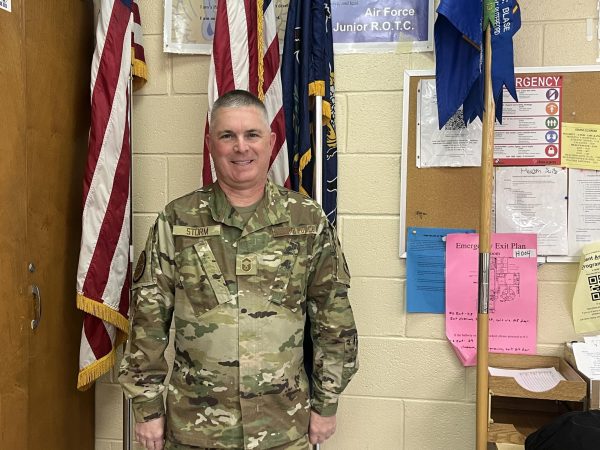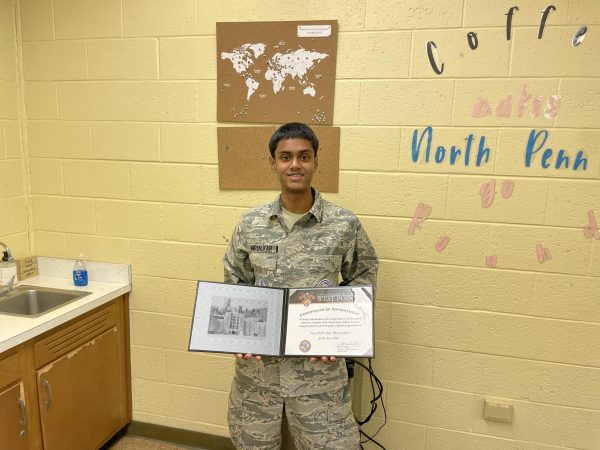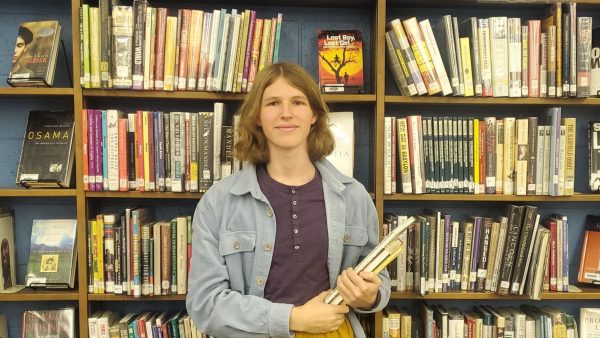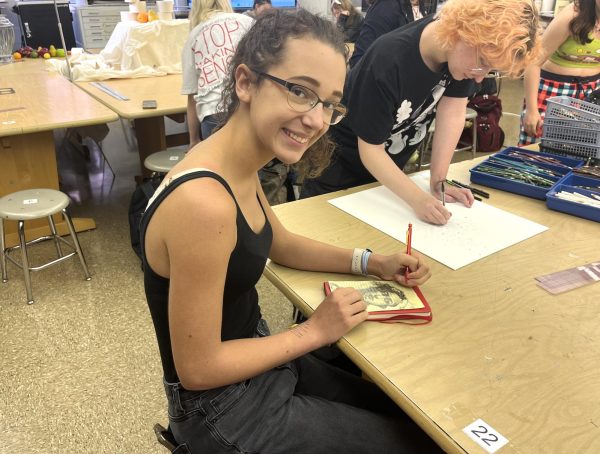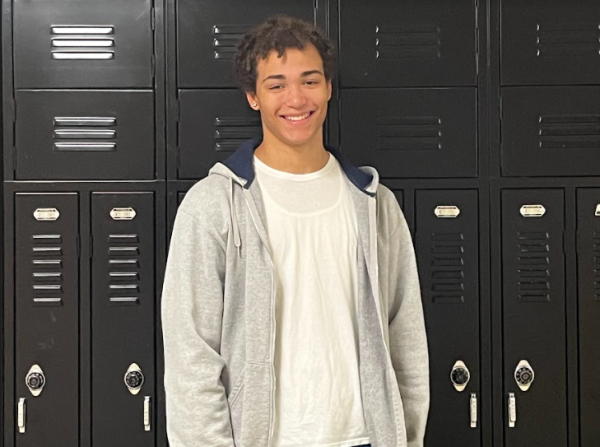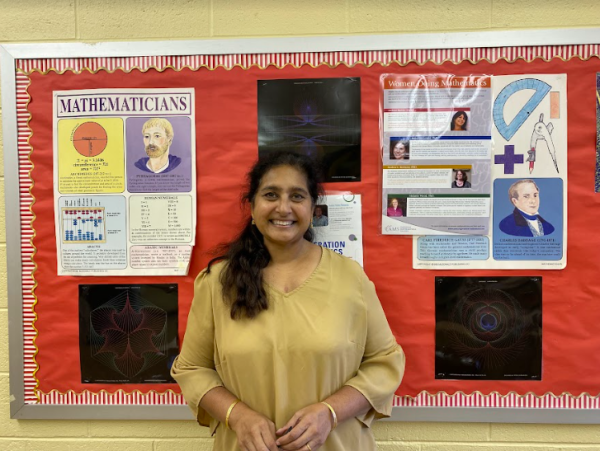A sweet sixteen surprise
TOWAMENCIN — The sound of clattering plates, laughing families, and quiet music filled the room as North Penn senior Arti Chhugani ate food with her family at a restaurant. Suddenly, her phone lit up with a notification that said she had been selected to study abroad in Bordeaux, France.
“I was in Canada for my 16th birthday at the time, so it was my own birthday surprise,” Chhugani said.
Chhugani said her final goodbyes to her friends and family in late August. After sitting through three plane ride trips, she finally arrived in Bordeaux, and immediately, she had to put her basic French speaking skills to the test.
“I was having so much trouble. I had four bags and I struggled to take them out of the airport without a cart and with nobody there to help me. I couldn’t find my host family. I had to communicate, for the first time, with somebody in French and ask them to help me with my suitcases, and it was difficult; it turned into an English and French mix,” Chhugani said.
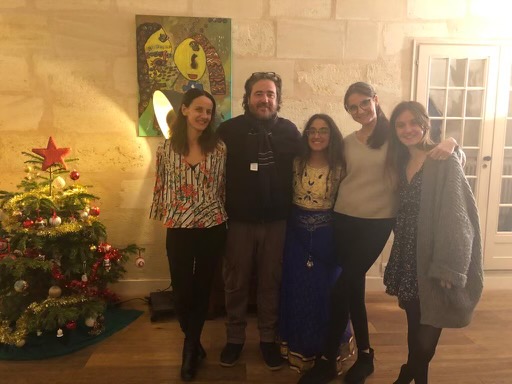
When she met with her host family, she initially felt overwhelmed. Coming from a place where she was able to easily understand what was going on around her, she felt lost in her new home.
“[Her host mom and sister] were speaking French at a fast pace, and I didn’t understand a single thing. I’m looking around at all of the road signs and they’re all in French, and I can’t understand a single word. My host mom began asking questions, and I sat there very confused, trying to answer, but couldn’t. I started responding in both English and French. I was just so lost,” Chhugani said.
Arriving at her host family’s house, she was met with her two host parents and two host sisters. Over time, she developed a strong bond with her host parents, specifically with her host dad because they would watch rugby and the World Cup together.
She arrived on a Saturday and by Monday, she started school. She had to use public transportation to go there, and it was her first time going on it independently. At first, it was difficult for her to navigate around the school and get used to what was normal for everyone else.
“In France, when a teacher comes to your class, you have to stand up before they come as a sign of respect. I didn’t know that, so on my first day, I just sat down and my teacher yelled at me. She told me that I lacked respect for her because I sat down before she told me I could. It was embarrassing and I was confused; I didn’t even understand every word that came out of her mouth, but I stood up because that’s what I got the hint at. After that, she realized I was an exchange student, so it was okay,” Chhugani said.
At school, each class lasted an hour and the entire school day lasted for 9 hours. Every Wednesday, her school had a half-day, which was normal for schools in France. Her classes utilized less technology and tests required written answers and were never in a multiple-choice format. In France, classes are grouped based on the track students want to follow for a certain career field. For Chhugani, she followed the history and economics track, and her schedule consisted of economics, history, math, and philosophy. At first, she found her classes to be difficult, mostly because she was still learning French and had to translate.
“The entire first month [her host parents] told me that my notes were illegible,” she said, “they didn’t understand what I was trying to say.”
One of the biggest things she had to learn to accept during her time in France was the fact that she wasn’t going to get perfect scores in school, something she prioritized in America.
“In an American environment, we’re very competitive in school and our grades matter a lot. When I went to France, I had that mindset that I had to be perfect. The first couple of times [when she received her scores], I took it really badly. My host family didn’t understand it at first because to them, it was just one score or one grade, and I was a foreign exchange student, so I shouldn’t expect to be perfect. They taught me that it was okay to not be perfect,” Chhugani said.
Chhugani joined a junior varsity rugby team, where she attended practice three days a week right after school. She is currently a part of the North Penn rugby team; however, rugby is more popular in Europe than it is in the United States. More people played rugby in France and for Chhugani, it felt more competitive.
“I would say that I play at a decent level back home, but I didn’t feel like I was playing as well there. It was amazing though because I got new coaching experience and I learned new techniques that I’ve never heard of [in America]. It definitely made me improve.” Chhugani said.
“Rugby also gave me a new community. I had friends at school, but with the team environment, we saw each other three to four times a week for game tournaments and practices, so we spent a lot of time on busses together. I really found a community that I felt a part of. I played rugby just like the other girls. Even though I was American and they were French, they really liked that. They were interested in my life in America and spoke English to me. I was able to find a place where I was able to bond with so many people,” Chhugani added.
Every single day, there was always something for her to do. If she wasn’t doing homework, she was either playing rugby or going out and about. While she did spend a large part of her day at school, Chhugani managed to fit in other activities to do.
“[In America,] I was more focused on school and I always followed the same routine. In France, I changed things up sometimes. I always had to go to school and I always went to rugby, but I went out more often and had more family time. I think the biggest reason for that is although school is very important, [French culture] emphasizes that you need time for yourself, and teachers understand that school isn’t everything—school isn’t super competitive there. You get your work done and you need to get good grades, but you’re not competing against other students to see who is better. In America, I feel like I need to work a lot harder, but in France, I learned that if I do my work and I do it well, then I’m fine,” Chhugani said.
They really treated me like a daughter. I didn’t feel like I didn’t have a family there because I did.
— Arti Chhugani
As someone who is very family-oriented, Chhugani expected to feel homesick often, but she felt at home with her host family.
“They really treated me like a daughter,” she said, “I didn’t feel like I didn’t have a family there because I did.”
Every evening, Chhugani would watch the news with her host family. Initially, she struggled to understand what was being said. Her host dad would have to translate it in English to her. At a certain point, after she stayed in France for a few months, she no longer needed her host dad to translate the news. Watching the news not only helped her improve with her French, but it also helped her recognize her progress.
Looking back, the two aspects that made her time in France worthwhile were rugby and her host parents. Her rugby teammates immediately welcomed her with open arms and made her feel like she was a part of a family. Her host parents were also supportive from the very beginning to the very end.
They took me in as their daughter right away and they trusted me with everything.
— Arti Chhugani
“They took me in as their daughter right away and they trusted me with everything,” she said, “That definitely made [her time in France] easier. I think if you have someone by your side when you’re struggling, it’s a lot easier to get through it. They not only made my experience easier, but they made it fun—they allowed me to do things I never expected to do. I didn’t think I would spend hours watching movies with them or talking about politics or whatever was going on, but I did, and that really made my experience amazing.”
Coming from an Indian-American household, Chhugani was used to eating foods with various spices and flavors. In France, the food is all about the natural flavors; however, she still loved it. She was able to try traditional homemade French food made by her host dad’s mother. She also got to try other foods like escargot, which is cooked snails, pâté, and foie gras. In December, Chhugani’s family visited and they went to Paris for the first time. They went to the Eiffel Tower, the Musée du Louvre, and the Arc de Triomphe. Chhugani also took them around in Bordeaux and they went to a well-known vineyard.
At first, when she got accepted to study abroad, her grandmother, who she has a strong relationship with, was afraid of letting her go on her own. It even reached the point where Chhugani debated whether or not she should go out of respect for her grandmother. However, when her grandmother visited, she realized she was going to be okay after all and was proud of her for being independent and getting this far.
“Living with my grandparents my entire life, I unconsciously became very dependent on them. The biggest thing for [her grandmother] was seeing that I could be independent,” Chhugani said.
Living with my grandparents my entire life, I unconsciously became very dependent on them. The biggest thing for [her grandmother] was seeing that I could be independent.
— Arti Chhugani
Some of her favorite memories with her host family went beyond watching movies together. Oftentimes, they would find themselves in deep conversations learning about each other. She will also always remember the first time she saw the Eiffel Tower when her family visited.
“I’d never seen it before. I remember walking on the street and when I saw it from a distance, I lost it. I almost started crying and I was so excited,” Chhugani said.
She also cherishes the memories she created with her rugby teammates when they rode on busses for tournaments.
“We listened to loud French music and we danced on the bus. I felt like I was a part of the French culture because everyone was speaking in French and the music was all in French. The team environment was amazing. I remember scoring a few times and they made it such a huge deal because they wanted to make me feel happy. They really lifted me up,” Chhugani said.
At the start of the pandemic, neighboring schools began to close due to cases rising. Her school immediately transitioned to virtual learning; however, the school was unprepared and left many of the teachers having to decide how they will continue teaching. Assignments were turned in on platforms similar to Canvas, but many students didn’t have access to technology.
Unlike the other study abroad students, Chhugani was able to stay in France until early June. She knew that she would no longer be able to attend school in person, play rugby, or hang out with her friends like she used to, but she built a strong relationship with her host parents and felt comfortable staying with them until the end.
“I wasn’t afraid of getting sick because my host-parents were very strict about quarantine and took a good amount of precautions. I was worried about the borders closing if I chose to stay, either for leaving France or getting into America. Or getting to the point where I’d be stuck there since my visa was going to expire in July,” Chhugani said.
During quarantine, she spent more time with her host family by watching movies, learning recipes, or chatting outside.
When the shutdown was lifted, people were allowed to go out to do non-essential things. However, her host parents did not want to take the risk and go out, but they wanted Chhugani to see her friends and experience France for one last time.
“Once I left the house, I wasn’t allowed to be close with my host parents,” Chhugani said, “I had to stay in my room upstairs and my host mom would bring me food. That was the same for my host sisters as well because they also chose to go out.”
“On my last day, [she and her host family] went outside and sat in the back porch and stayed socially distant. We talked and spent time together. It was so sad because we couldn’t sit close together on the couch and watch movies like we used to. The morning of, I balled my eyes out and told them that it would never be the same again, even when I come back,” Chhugani added.
When she came back to Pennsylvania, things weren’t the same. She had spent nearly a year in a completely different environment and coming back to her “old life” felt strange.
“Of course, I was happy to see my family, but for the first two weeks, I stared at my room and was like, ‘this is not where I’m supposed to be.’ This was the younger me where I was immature and dependent on others. I felt like I was supposed to be in France. I felt like I left everything there and couldn’t bring it back,” Chhugani said.
Soon, she realized that although her time in France took an unexpected turn, she still matured and became the person she is today. Despite not being in France anymore, she will always remember how much it changed her for the better.
“Going to France made me realize I could do everything on my own—I felt confident. And I learned how to get through things. I did horrible on some of the tests in the beginning of the year, and I felt hopeless. When I saw the progress, it felt rewarding. Things could be hard, but I could get through it. This program just pushed me out of my comfort zone and made me do something new,” Chhugani said.




